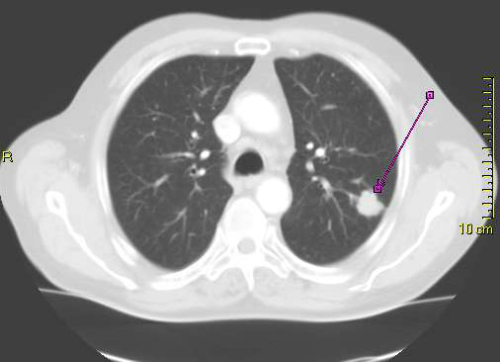New Guidelines from Four Major Societies
The American Cancer Society (ACS), the American College of Chest Physicians (ACCP), the American Thoracic Society (ATS), and the National Comprehensive Cancer Network (NCCN) have all recently issued new clinical guidelines for lung cancer screening and treatment.

The American Cancer Society
The ACS now recommends routine, annual low-dose CT for patients who are at high risk due to smoking history. The ACS does not recommend tests to check for lung cancer in people who are at average risk. But, we do have screening guidelines for those who are at high risk of lung cancer due to cigarette smoking. Screening might be right for you if you are all of the following:
- 55 to 74 years of age
- In good health
- Have at least a 30 pack-year smoking history AND are either still smoking or have quit within the last 15 years (A pack-year is the number of cigarette packs smoked each day multiplied by the number of years a person has smoked. Someone who smoked a pack of cigarettes per day for 30 years has a 30 pack-year smoking history, as does someone who smoked 2 packs a day for 15 years.)
If your patient fits this description, it is good medicine to start to talk to him or her about screening for lung cancer using annual low-dose CT.
The American College of Chest Physicians and the American Thoracic Society
The American College of Chest Physicians and the American Thoracic Society together published the latest policy statement in the journal Chest: “Components Necessary for High-Quality Lung Cancer Screening: American College of Chest Physicians and American Thoracic Society Policy Statement.”
According to the ACCP/ATS statement,
Lung cancer screening with a low-dose chest CT scan can result in more benefit than harm when performed in settings committed to developing and maintaining high-quality programs. This project aimed to identify the components of screening that should be a part of all lung cancer screening programs. To do so, committees with expertise in lung cancer screening were assembled by the Thoracic Oncology Network of the American College of Chest Physicians (CHEST) and the Thoracic Oncology Assembly of the American Thoracic Society (ATS).
Lung cancer program components were derived from evidence-based reviews of lung cancer screening and supplemented by expert opinion. This statement was developed and modified based on iterative feedback of the committees. Nine essential components of a lung cancer screening program were identified. Within these components 21 Policy Statements were developed and translated into criteria that could be used to assess the qualification of a program as a screening facility. Two additional Policy Statements related to the need for multi-society governance of lung cancer screening were developed.
High-quality lung cancer screening programs can be developed within the presented framework of nine essential program components outlined by our committees. The statement was developed, reviewed, and formally approved by the leadership of Chest and the ATS. It was subsequently endorsed by the American Association of Thoracic Surgery, American Cancer Society, and the American Society of Preventive Oncology.
National Comprehensive Cancer Network: Screen for ALK and EGFR
The NCCN has released new screening guidelines for many types of cancer, including NSCLC. “These NCCN Guidelines Insights focus on recent updates to the 2015 NCCN Guidelines for NSCLC. Targeted therapy is very effective in select patients with advanced NSCLC who have specific genetic alterations. Therefore, it is important to test tumor tissue for these genetic alterations in patients with advanced NSCLC to determine whether they are candidates for targeted therapy. It essential to screen for these mutations as early as possible in the treatment process.
“These NCCN Guidelines Insights describe the different testing methods currently available for determining whether patients have genetic alterations in the 2 most common actionable abnormalities, notably ALK gene rearrangements and sensitizing EGFR mutations.
The NCCN Guidelines for NSCLC recommend molecular testing for ALK-gene rearrangements and EGFR mutations (category 1) in patients with advanced adenocarcinoma so that these patients can receive effective first-line treatment … with targeted agents.”
- In patients with squamous cell carcinoma, in which these abnormalities are much rarer, molecular testing for ALK gene rearrangements and sensitizing EGFR mutations can be considered, especially in patients with a small biopsy specimen in which a mixed histology component may be missed or in those who have other risk factors, such as minimal smoking history.
- DNA mutational analysis for sensitizing EGFR mutations is the preferred method to determine eligibility for EGFR-TKI therapy.
- Direct sequencing of DNA corresponding to exons 18 to 21 of the EGFR gene is a reasonable approach; however, more-sensitive mutation-specific methods are available.
- ALK gene rearrangements can be detected using dual-probe break-apart FISH assay. Studies suggest that other assays, such as RT-PCR or IHC, can also be used to screen for ALK rearrangements.
- Because multiple different techniques exist for IHC, until a specific widespread ALK IHC technique is validated, it is not yet possible to recommend IHC for ALK screening.
- Multiplex molecular testing may be possible for actionable mutations and for gene rearrangements, depending on the techniques and platforms used. Multiplex molecular testing offers potential advantages by minimizing delays and tissue requirements, potentially increasing both efficiency and cost-effectiveness, and identifying rarer but still potentially actionable abnormalities in other driver oncogenes that would make patients candidates for enrollment onto clinical trials.
